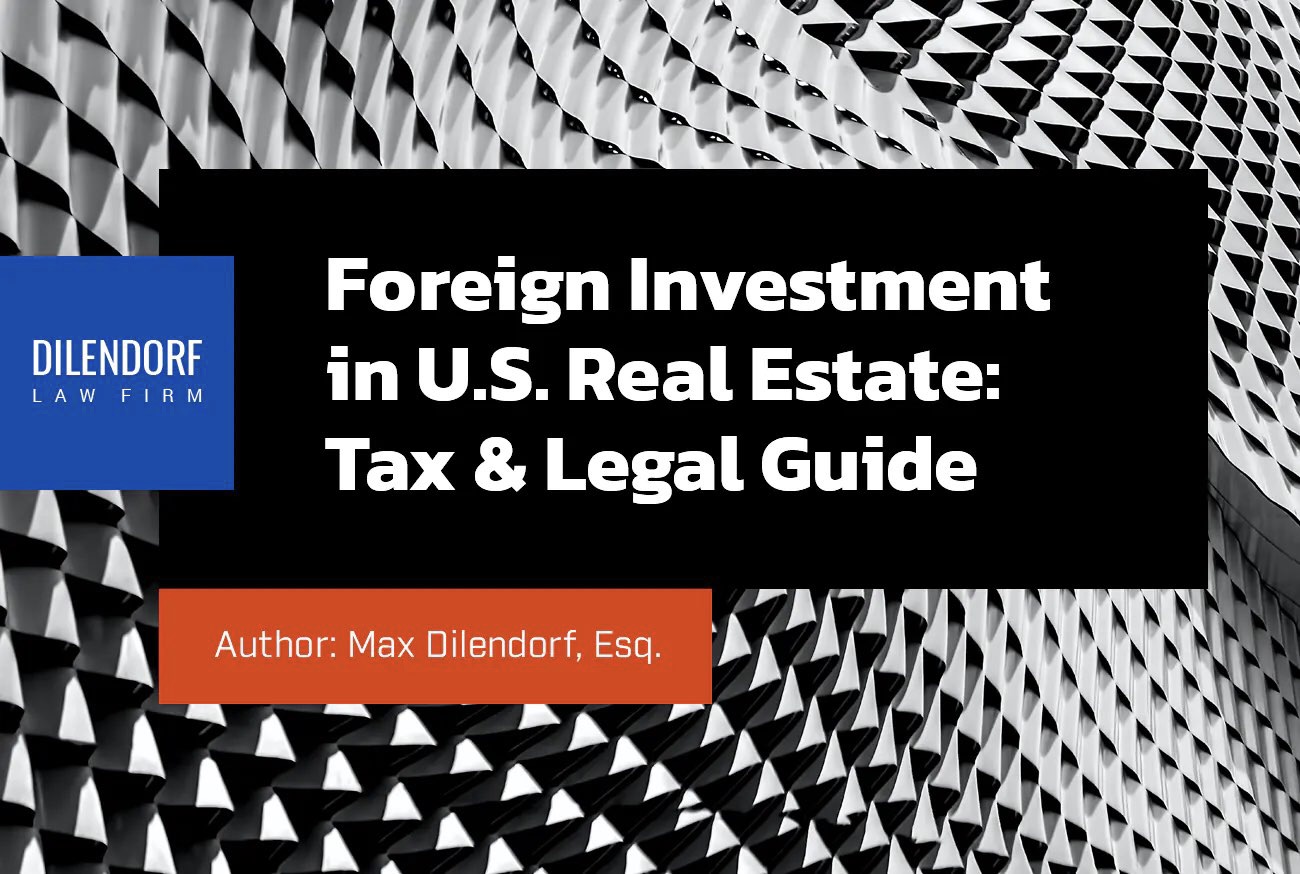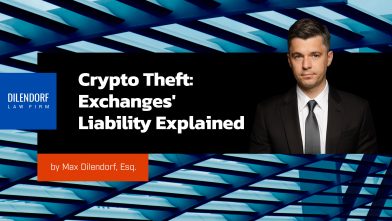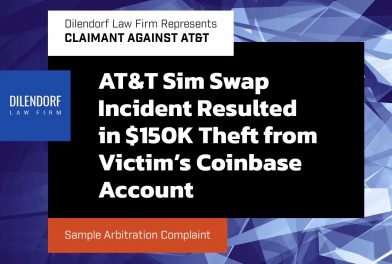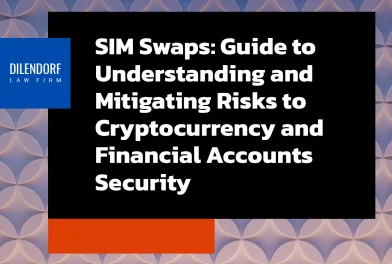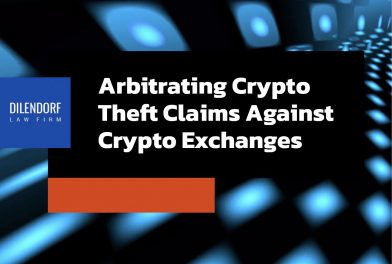How Foreign Investors Can Use Trusts to Buy U.S. Real Estate
Please get in touch with our team to schedule a consultation to discuss your purchase of U.S. real estate. Email: info@dilendorf.com. Phone: 212.457.9797.

The last decade has seen a surge in foreign buyers purchasing real property in the United States. These buyers are motivated by any number of reasons, from investing to giving a family member in the U.S. home.
Whatever the reason for a purchase, foreign investors must pay careful attention to the U.S. tax consequences of the ownership structure they use.
Without a proper structure, income earned on the property can be subject to U.S. tax rates of up to 65%, including a tax on income repatriation. If the foreign investor owns the property at death, it can be subject to the U.S. estate tax at rates of up to 40% of its value, subject only to a $60,000 exemption.
To minimize these taxes, many foreign investors establish a U.S. or foreign trust to purchase and own their U.S. real estate, which can reduce taxes on the income generated by the property and eliminate U.S. estate tax.
However, doing so requires understanding the complex tax rules that apply to trusts. This article provides an overview of those rules and how they affect different kinds of trusts.
The Advantages of Using Trusts
A properly structured trust offers several advantages for a foreign buyer of U.S. real estate. First, it can reduce U.S. taxes. Additionally, it can protect the buyer’s privacy and non-trust assets.
Tax Advantages
To understand the tax advantages of using a trust, a foreign buyer must first understand how the U.S. government taxes nonresident aliens (NRAs) generally.
Income Taxation of NRAs
In addition to the income tax, the U.S. government also imposes an estate tax on the transfer of property at death.
For nonresidents, the estate tax applies to U.S.-situs property at rates of up to 40% of the property’s value.[1] This tax applies to the extent the property value exceeds the $60,000 estate-tax exemption available for nonresidents.[2]
By establishing a properly structured non-grantor trust—discussed in more detail below—a foreign investor can remove U.S. assets from his or her U.S. estate.
Other Advantages
Owning U.S. real estate in a trust offers two non-tax advantages for foreign investors.
First, a trust can protect the investor’s privacy. Real estate held in trust is titled in the trustee’s name, not the investor’s.
Additionally, the instrument creating the trust does not become a public record, making it difficult for the investor’s identity to be discovered.
Second, depending on how the trust is structured, the trust can protect the investor’s non-trust assets from trust liabilities by creating a legal separation between trust and non-trust property.
Both advantages can be enhanced by having the trust establish a U.S. limited liability company (LLC)—which is disregarded for tax purposes—to own the U.S. real estate.
Although forming an LLC requires a public filing, if the LLC is formed in a state like New York or Delaware, that filing does not disclose the identity of the LLC’s owner.
In addition, the LLC creates a legal separation between its own liabilities and the assets of its owner—in this case, the trust.
Trust Structures Available for Foreign Investors
When establishing a trust to own U.S. real estate, foreign buyers must decide whether to form a grantor or non-grantor trust and whether it should be the U.S. or foreign trust.
Each of these decisions has important income and estate tax consequences.
Grantor vs. Non-Grantor Trusts
U.S. taxation of a trust depends in large part on whether the trust is a grantor trust or a non-grantor trust. A trust established by an NRA will be treated as a grantor trust if:
- The settlor—i.e., the person who creates the trust—retains the right to revest title to trust property in him- or herself, without the approval or consent of another person; or
- The trust can distribute amounts only to the settlor or his or her spouse during the settlor’s life.[3]
In general, a grantor trust is disregarded for both income- and estate tax purposes.
The settlor pays any U.S. tax due on trust income as if he or she earned the income directly.[4]
In addition, U.S. property held in a grantor trust is includable in the settlor’s estate for U.S. estate tax purposes, making such trusts a poor choice when the estate tax is a concern.
In contrast, a non-grantor trust is taxed as an independent taxpayer. Trust income is taxed at accelerated marginal rates,[5] but the trust is entitled to a deduction to the extent it distributes income during the year it is earned.[6]
Rather than being taxed to the trust, such income is taxed to the beneficiaries who receive the distributions.[7]
Regarding estate tax, the property held in a non-grantor trust will not be included in the settlor’s estate unless the settlor retains certain rights in the trust or trust property.[8]
U.S. vs. Foreign Non-Grantor Trusts
How a non-grantor trust’s income is taxed depends on whether it is a U.S. trust or a foreign trust.
Like U.S. citizens and resident aliens, a U.S. non-grantor trust is taxed on its worldwide income and does not benefit from the special exemptions available to NRAs.[9] In contrast, a foreign non-grantor trust is generally taxed in the same way as an NRA.[10]
The distinction between the U.S. and foreign trust also has important consequences for any U.S. beneficiaries of the trust.
If a U.S. beneficiary is permitted to use the trust’s U.S. real estate for free, then he or she will be treated as having received a distribution to the extent of the fair rental value of that property.[11]
In addition, the U.S. beneficiary will be required to report that deemed distribution (and any other distributions) on Form 3520.[12]
The U.S. government uses two tests to classify a trust as a U.S. trust or a foreign trust: the court test and the control test.[13] A trust will be classified as a U.S. trust only if it satisfies both tests.
The Court Test
The court test requires that a court within the United States can exercise primary supervision over the trust’s administration.[14] To simplify compliance, the Internal Revenue Service has defined a “safe harbor,” explaining that the court test is satisfied if:
- The trust instrument does not direct that the trust be administered outside of the U.S.;
- The trust is, in fact, administered exclusively in the U.S.; and
- The trust is not subject to an automatic migration provision in the event a U.S. court attempts to assert jurisdiction over the trust.[15]
The Control Test
The control test requires that one or more U.S. persons—i.e., U.S. citizens, residents, partnerships, or corporations[16]—have the authority to control all substantial decisions of the trust.[17] Substantial decisions are any non-ministerial decisions, such as:
- Whether and when to distribute income or corpus
- The amount of any distributions
- Whether to allocate a receipt to income or principal
- Whether to terminate the trust
- Whether to remove, add, or replace a trustee, or to appoint a successor trustee
- Investment decisions[18]
Selecting the Optimal Trust Structure for U.S. Real Estate
Given the variety of trust structures available and the diversity of foreign investors’ goals when buying U.S. real estate, choosing an optimal trust strategy is a fact-specific analysis.
Numerous factors will drive trust structuring recommendations. The following is an abbreviated list of the standard planning considerations.
- The intended use of real estate – whether for personal or business use;
- Whether the purchaser and/or his family members plan to live in a property owned by a trust;
- Number of properties acquired;
- How a grantor will be funding the trust (e.g., onshore or offshore company or individual bank account);
- Holding structure inside of a trust;
- Whether the trust’s grantor(s) will also be its beneficiaries;
- Whether any of the trust’s beneficiaries are resident aliens for U.S. tax purposes;
- Whether a trust will be making distributions to beneficiaries, who are NRA for U.S. tax purposes.
Conclusion
As more foreign buyers become interested in owning U.S. real estate, they must keep in mind the different ownership structures available to them.
The optimal strategy for investing in U.S. real estate depends on each investor’s unique circumstances and goals, and the tax rules applicable to such strategies.
Our firm represents individuals, families and private funds across a wide range of U.S. real estate transactions including purchases, sales and leasing, construction, development, financing and joint ventures. We also work closely with non-U.S. residents looking to invest in the U.S., relocate their families to the U.S., expand business into the U.S. or pass wealth to the U.S. beneficiaries. We use our expertise in U.S. taxation, corporate law and cross-border transactions to structure inbound direct investments that are tax efficient and provide advice on FATCA, FIRPTA, CRS compliance, PFIC rules and CFC rules.
Co-Author: Rika Khurdayan, Esq.
Resources
[2] 26 U.S.C. § 2102 (providing a $13,000 credit, exempting $60,000 in value from taxation)
[5] Compare 26 U.S.C. §§ 1(a) – (d) (rates applicable to individuals) and 26 U.S.C. § 1(e)(2) (rates applicable to non-grantor trusts)
[6] See 26 U.S.C. §§ 661, which applies to trusts that can accumulate income from year to year. Trusts that are required to distribute all income in the year it is received are not taxed on that income. 26 U.S.C. § 651. Instead, all trust income is taxed to the beneficiaries. 26 U.S.C. § 652.
[7] 26 U.S.C. §§ 652(a), 662(a)
[8] See 26 U.S.C. §§ 2036, 2038
[9] 26 U.S.C. §§ 641(b), 1; Treas. Reg. § 1.1-1(b)
[10] 26 U.S.C. §§ 641(b), 871
[12] See Instructions for Form 3520
[13] 26 U.S.C. § 7701(a)(30)(E); Treas. Reg. § 301.7701-7
[14] 26 U.S.C. § 7701(a)(30)(E)(i); Treas. Reg. § 301.7701-7(a)(1)(i)
[15] Treas. Reg. § 301.7701-7(c)(1)
[16] Treas. Reg. § 301.7701-7(d)(1)(i); 26 U.S.C. § 7701(a)(30)
[17] 26 U.S.C. § 7701(a)(30)(E)(ii); Treas. Reg. § 301.7701-7(a)(1)(ii)
[18] Treas. Reg. § 301.7701-7(d)(1)(iv)
[19] Foreign Investment in US Real Estate: Tax & Legal Guide
____________________________________________________________________
Tax Disclaimer: The information contained herein is general in nature and based on authorities that are subject to change. We do not guarantee neither the accuracy nor completeness of any information and is not responsible for any errors or omissions, or for results obtained by others as a result of reliance upon such information. We assume no obligation to inform the reader of any changes in tax laws or other factors that could affect information contained herein. This publication does not, and is not intended to, provide legal, tax or accounting advice, and readers should consult their tax advisors concerning the application of tax laws to their particular situations.
Circular 230 Disclosure: This analysis is not tax advice and is not intended or written to be used, and cannot be used, for purposes of avoiding tax penalties that may be imposed on any taxpayer.

